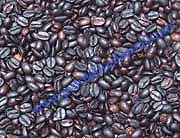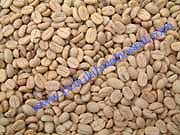![]()
Unser organischer Kaffee wird in den Bergen des Pululahua Kraters von der lokalen Bevölkerung geerntet. Dieser Kaffee waechst wild unter freiem Himmel von 1600 bis zu 1800m Hoehe. Der Kaffee , welcher arabischen Types entspricht, wurde höchstwahrscheinlich von den Spaniern eingeführt und dann durch die Vögel verbreitetet. Aus diesem Grund hat dieser wilde Kaffee ein großartiges, reiches Aroma und eine ausgezeichnete Form.


Unser Röstverfahren ist einfach und günstig. Damit können wir einen geschmackvollen, organischen Kaffee zu einem ekonomischen Preis anbieten. Wir bieten vier verschiedene Kaffesorten an: Leicht, Mittel, Espresso und unsere spezielle Pululahua-Mischung.
Preis $7 fuer 1 pound , 4$ fuer ½ pound
Der Kauf von Kaffee hilft der einheimischen Bevölkerung ein besseres Leben zu fuehren;viele der Einheimischen versuchen ihr Glueck ausserhalb des Kraters in einer der groesseren Staedte. Häufig endet dies in Armut, Verbrechen und Drogenhandel. Bitte helfe Sie uns!
![]()
Unser kleiner organischer Bauernhof ist eine Quelle von großer Freude und vieler harter Arbeit. Wir haben eine kleine Schweinezucht mit 10 bis 20 Schweinen. Diese werden, ganz im biologischem Sinne, hauptsaechlich mit Mais, Kürbis und organischen Kuechenabfaellen gefuettert.
Organische Schweinelende ca. $3.50 pro halben Kilo.
Organische Schweinefleischrippen ca. $2.50 pro halben Kilo.
Restliches Schweinefleisch $2.00 pro halben Kilo.
![]()
Unsere Meerschweinchen werden nur mit der besten Luzerne gefuettert, die in unserer Hazienda produziert wird.
Lebende Meerschweinchen $5
Gefrorene Meerschweinchen $7
![]()
Unsere schönen Hennen werden taeglich mit Mais und einem frischen Luzernesalat gefuettert. Diese fleissigen, kleinen Freunde produzieren unsere köstlichen Eier, die Sie gerne bei einem leckeren Frühstück probieren koennen.
organische Eier für $0.25/Ei.
![]()
Alle 3 Monate haben wir einen neuen Hahn.
Lebender Hahn $12
Gefrorener Hahn $15
![]()
Zur Zeit befinden wir uns immer noch im Lernprozeß und experimentieren, welche Produkte am besten im Krater zur jeweiligen Zeit gedeihen.
Wir haben bisher noch kein ofizielles Zertifikat erhalten koennen, da dieses entsprechend hohe Kosten fuer unsere kleine Farm mit sich bringt.

The Pululahua Hostel is focused on sustainable Ecological tourism. For this reason we have installed several systems to minimize the environmental impact that we produce. Part of this system is our organic farm which allows us to be self-sufficient with organic products.
The purpose of the organic farm is to provide healthy food for tourists interested in visiting the Pululahua Crater without harming the environment. It is necessary that tourism within the of Pululahua Volcano and it’s Geobotanical Reserve be better channeled to not cause environmental damage because this reserve is very fragile and vulnerable due to its proximity to Quito.
Water
This is a very important issue because all the water supply comes from the fog that condenses on the vegetation on Nun Hill. The fog and Nun Hill are under pressure. The fog comes from moisture accumulated in the rain forest of Esmeralda’s, this region is under enormous pressure from destruction by uncontrolled logging. The Nun Hill is also at risk by the closeness to agricultural production. Each summer the corn stubble is burned, the fire and the summer winds threaten the vegetation responsible for water condensation.
In our hostel and farm we put a great deal of effort to minimize the use and waste of this vital fluid. In the cabañas, kitchens, and whirlpool, we installed pipes to collect the water and to send it to a recycled water tank. This water is used to irrigate our garden and sixty fruit trees.
The rainwater is channeled from the ceilings and sent to a tank of drinking water (still under construction), in which the water is filtered and purified for human use.
In our organic farm we collect the water used to wash the pig farm, spent water from a kitchen sink, and a shower from the caretaker’s house. This water is collected in a tank that is emptied twice a week. This water, rich in nutrients, is distributed in our organic farming.
The Organic Fertilizer
The design of our pig stalls allow to separate the water from the solid waste. All solid waste is collected for composting which is converted into organic fertilizer for crops. In the same way we compost all of the waste material generated by the guinea pigs, chickens, and horses.
By the end of next year we are planning the installation of a more comprehensive system to exploit production bio-gas (natural gas generated from the decomposition of organic matter) to be used in our stoves, hot water heaters for the showers and whirlpool. The effluent from this system will be a better fertilizer and as an extra bonus the presence of flies and odors will be reduced.
Production of Organic Food
We produce organic alfalfa, yellow corn, white corn, morocho, beans, and peas. We also have had good results with vegetables such as lettuce, cabbage, carrot, radish and beet.
The corn and alfalfa are fed mainly to the pigs and horses. A small portion of it is consumed by the guinea pigs, and chickens, which in turn produce eggs. Chicken, eggs, pigs, and guinea pigs are our main source of organic protein produced. Horses that eat most of the organic alfalfa generate a good portion of our sales tourist.
We also buy several organic products produced in an area. Especially to families who subsist on their agricultural production. One of these products is organic coffee which is harvested by native farmers who live in the mountains west of the Pululahua Crater. This coffee, possibly of the Arabica type, was brought by the Spaniards and spread by the birds, it grows in the heights of 1600 to 1800 m and lives under the shadow of the rain forest trees in the area. The coffee we produce is of a very good taste, good flavor and body. Tourists can buy our coffee and can also participate in the process of roasting.
Organic Farming
The agricultural practices within the crater have been mostly green. The natives of this area used oxen for plowing and preparing land for sowing. All planting is done by hand and a hoe is used to clean the weeds after they germinate. Later the oxen is used again for a final plowing called “chikta” which helps bury grasses that compete with the crop.
We have adopted these environmental practices in our own crops. These practices help preserve the environment without causing additional burdens to global warming. Our tractors are a small horse Creole called Zeus and a small hairy burrito called “Peluche”. These animals have learned to pull the plow and contribute to the ecological work to control weeds without the use of pesticides.
Production costs are too high to compete with mechanical processes, but we achieved a small profit by using these products in the main dishes we serve to our customers.
Handling Garbage
All organic wastes from the restaurant are consumed by pigs. The remaining inorganic waste is separated and classified to bring it to recycling centers.
Employment
We are proud to work with the community of Pululahua for two years supporting a few families. The community has been our source of workers for the organic farm, construction, and tourism guide. They have also been a source of knowledge for the operation of our ecological farm
Telefon: (593)999466636 593991914333 e-mail: ![]()
Telfon:
593-999466636
593-991914333
e-mail:![]()
Copyright © 2006 - 2016 Pululahua Hostal
Link to local weather stations INAMHI
